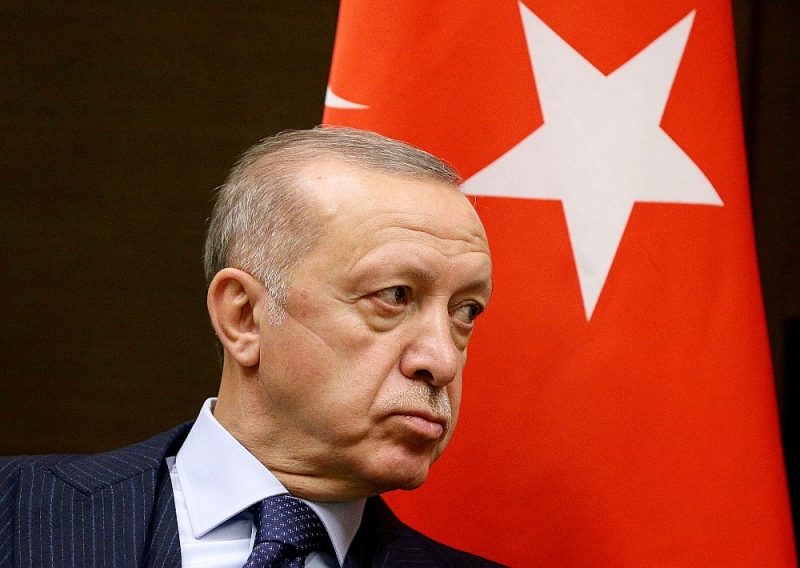
According to experts, by carrying out the threat of expelling Western ambassadors, Turkish President Regepi Taipa Erdogan would destroy his country’s economy by hand.
Photo: Vladimir Smirnov / SPUTNIK / REUTERS
Viesturs Sprūde, “Latvijas Avīze”, JSC “Latvijas Mediji”
Both European and Turkish politicians sighed with relief when they learned on Monday that an unprecedented diplomatic conflict between Turkish President Regepi Tajip Erdogan and ten Western ambassadors had been successfully smoothed out. The question remains: what was it at all? And why was that necessary?
Ambassadors away
–
The news
The hospital reveals which vaccines have been given to Covid-19 inpatients
9 hours
–
The news
“The gods themselves are fighting in vain against the fool!” Šadurskis believes that the teachers’ open letter has a place in the trash
10 hours
–
The news
Member of Parliament reveals whether vaccinated people will be able to return to normal life after 15 November
1 day
–
The crisis began on Saturday when Erdogan emotionally announced that he had instructed the Turkish Foreign Ministry to declare the ambassadors of the United States, Germany, Canada, Denmark, Finland, France, the Netherlands, New Zealand, Norway and Sweden “persona non grata” and to ensure that they sooner ”.
The cause of the anger was the joint call of the diplomats of these countries for the release of opposition activist Osman Kavala. Kavala, a 64-year-old businessman, was previously accused of organizing protests against the government, but the accusation failed and then new charges were brought against him for allegedly participating in a failed coup and “espionage” by the Turkish military in 2016. The opposition itself, who has been in prison since 2017, denies his involvement.
He is still not summoned to court in this regard either. Back in December 2019, the European Court of Human Rights ruled that Kavala should be released pending trial. However, Turkey is ignoring the verdict. The announcement by ten Western ambassadors, which provoked an inadequate response from Erdogan, was only a reminder to resolve the matter, otherwise it would overshadow Turkey’s international prestige.
For his part, the Turkish president felt that there had been interference in the country’s internal affairs and that the ambassadors “should leave here if they do not understand Turkey”. For several days, there was confusion, as Erdogan did not mention the deadlines for the expulsion of the ambassadors in the outbreak of anger, nor did the countries concerned receive any official documents on the expulsion of the ambassadors.
On Monday, the United States and other participating states issued a statement of respect for Article 41 of the 1961 UN Vienna Convention on Diplomatic Relations, which states that diplomats have a duty to respect the laws and regulations of the host country and not to interfere in that country’s internal affairs. This step allowed Erdogan to get out of the awkward situation in which he had found himself.
On the evening of the same day after the government meeting, Erdogan, already calm on live TV, said that the Western ambassadors had “resigned from the slander of our country” and would be “much more careful in their statements on Turkey’s sovereign rights”. Turkey’s “honor and pride” is protected. During the government meeting, ministers reminded Erdogan that the deepening conflict would destroy the Turkish economy, as evidenced by the sharp decline of the Turkish lira immediately after the scandal began. By recklessly isolating itself from the Allies, Turkey would also be harmed in the context of NATO, where there is already a controversy over the Turkish decision to buy Russian-made air defense systems, potentially considering the purchase of Russian warplanes.
How to regain popularity
Many experts in the West point out that what happened is an attempt to regain its declining popularity. Surveys show that Erdogan’s support for the Justice and Development Party’s (AKP) party has fallen below 30%, while opposition opposition forces are growing.
If the election were held now, Erdogan would lose. The country’s economic situation has deteriorated during the ACP period, inflation is 20%, the cost of living is rising and the Turkish lira is depreciating against the US dollar and the euro, but many Turks have dollar loans, making it difficult to repay them. The middle class in society is seriously concerned about the possibility of falling into the zone of poverty.
Corruption is also growing in the country. Viewers of the German press, who are closely following what is happening in Ankara due to the large Turkish diaspora and close economic ties, are convinced that the expulsion of ambassadors, if it did, would mean that Erdogan had dug up a political “grave” for himself. The Turkish lira would collapse and the country, which is dependent on food and energy imports, would face difficulties with unforeseen consequences.
Observers and the opposition say this is not the first time Erdogan has tried to escape domestic political difficulties with loud and non-diplomatic statements about various external and internal “enemies” or the salvation of the nation’s honor, simply put, in an attempt to demonstrate that he is “old.” He does not tend to admit mistakes.
“It is not about Osman Kavala or the independence of the judiciary. Erdogan just wants to polarize society. Instead of the logic of a statesman, he uses gossip speeches. It is a shame for our country, “said Ahmed Davutoglu, the leader of Turkey’s Future Party, former foreign minister and prime minister and former Erdogan’s associate.
The Council of Europe (EP), of which Turkey is a member, has given Ankara time to clarify the Kavala case by the end of November, when the EP will meet. Otherwise, the Council could vote to open disciplinary proceedings against Turkey. The consequence could be the suspension of Turkey’s voting rights and even membership of the Council of Europe.
Themes
–


